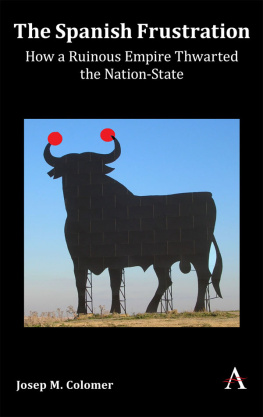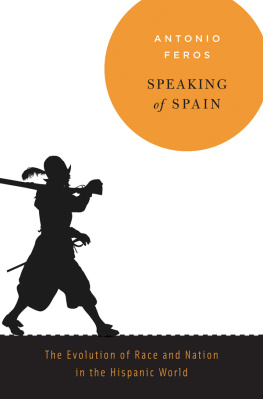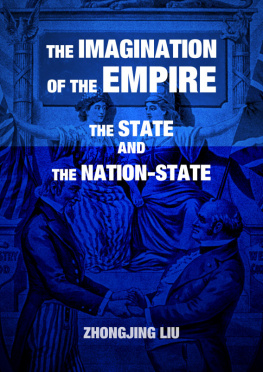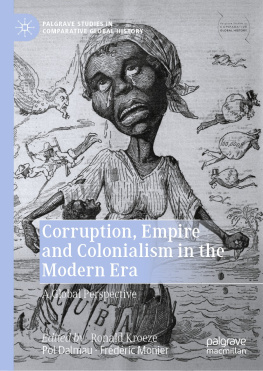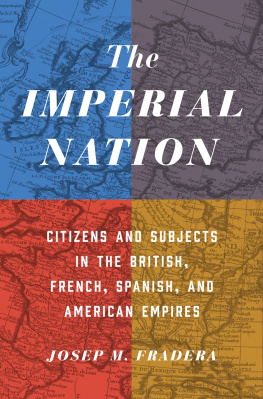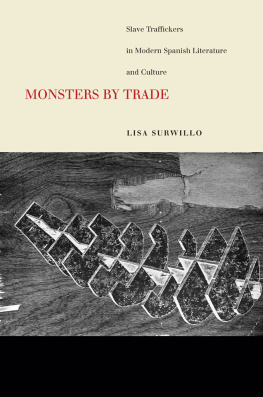The Spanish Frustration
The Spanish Frustration
How a Ruinous Empire Thwarted the Nation-State
Josep M. Colomer

Anthem Press
An imprint of Wimbledon Publishing Company
www.anthempress.com
This edition first published in UK and USA 2019
by ANTHEM PRESS
7576 Blackfriars Road, London SE1 8HA, UK
or PO Box 9779, London SW19 7ZG, UK
and
244 Madison Ave #116, New York, NY 10016, USA
Copyright Josep M. Colomer 2019
The author asserts the moral right to be identified as the author of this work.
All rights reserved. Without limiting the rights under copyright reserved above, no part of this publication may be reproduced, stored or introduced into a retrieval system, or transmitted, in any form or by any means (electronic, mechanical, photocopying, recording or otherwise), without the prior written permission of both the copyright owner and the above publisher of this book.
British Library Cataloguing-in-Publication Data
A catalogue record for this book is available from the British Library.
ISBN-13: 978-1-78308-988-8 (Hbk)
ISBN-10: 1-78308-988-1 (Hbk)
This title is also available as an e-book.
COMMENTS ON THE SPANISH EDITION
The book is extraordinarily good, even the social criticism, in some ways more important than the politics. Altogether a splendid analysis. The intellectually sturdiest book on Spain some time.
Stanley G. Payne, Professor of History, University of Wisconsin, USA
One of the most severe books on Spain that have been published in recent years. The Spanish Frustration reviews more than five centuries of Spanish history with an analysis without concessions for optimism. It makes the reader regret having been born into the Peninsula.
El Pas, Madrid
Colomer provides a carefully selected empirical information that perfectly illustrates his arguments, and his clear and austere prose, characteristic of all his texts, manuals, monographs and press articles, converts reading into a placid entertainment. He does not resort to his discourse to essences and stereotyped national characters, but he wields serious data and arguments. Thats why his book is so stimulating.
Oscar R. Buznego, Professor of Political Science, University of Oviedo, Spain
PRAISE FOR OTHER BOOKS BY THE AUTHOR
The Science of Politics
I dont think that anyone has tried to write something like this before. If one wants to give an overview of political science, then this is about the only book there is! James A. Robinson, Harvard University, USA
The European Empire
Erudite and scholarly, yet accessible and elegantly written. The argument is innovative, yet confident and convincing. Helen Margetts, Oxford University, UK
How Global Institutions Rule the World
A thoughtful and thought-provoking book. Martin Wolf, Financial Times
Great Empires, Small Nations
An original and persuasive book. Jan Zielonka, Oxford University
I expect this book to be widely read and greatly admired. Sidney Weintraub, Center for Strategic and International Studies, USA
Handbook of Electoral System Choice
A new and highly original theory of electoral change which lays the groundwork for a radical revision of what has become the common wisdom. Bernard Grofman, University of California, Irvine, USA
This is a major achievement and provides the foundation for much future work. Ron Johnston, British Journal of Political Science and International Relations
Political Institutions
An outstanding contribution. A first-rate scholarly achievement! Arend Lijphart, President of the American Political Science Association
A well framed, well-constructed, well documented and well-argued book. Gianfanco Pasquino, Rivista Italiana di Scienza Politica
Strategic Transitions
Colomer has exemplary knowledge of the political dynamics of democratization in the contemporary world. David Laitin, Stanford University, USA
Political Institutions in Europe
Josep M. Colomer is one of the most brilliant, imaginative and cosmopolitan
scholars in political studies. Javier Tusell, El Pas
Game Theory and the Transition to Democracy
One of the best books of Political Science on transitions. Juan J Linz, Yale University, USA
One of the few original contributions to the literature on transitions to democracy Adam Przeworski, New York University, USA
CONTENTS
This is an essay of interpretation of several important aspects of present-day Spain in light of its modern history as well as an interpretation of past stories in light of present-day Spain. Old troubles with remote origins persist in current Spain, including huge public debts, extensive corruption, widespread unlawfulness, oligarchical politics, territorial splits and permanent protests and riots. The basic argument in this book is that, in the long term, Spain missed the opportunity to become a consolidated modern nation-state because it was entangled in imperial adventures for several centuries instead of building solid domestic bases for further endeavors. In short, a ruinous empire made a weak state, which built an incomplete nation, which sustains a minority democracy.
The broad overview presented here includes summaries of several original researches by the author and new arguments and elaborations. I have also reviewed all the publications that I thought deserved to be reviewed and quote a selection of supporting observations, narratives or postulates from historians, political scientists, economists, sociologists and literary authors. The greatest intellectual debt, as the reader will observe, is with the always remembered Juan J. Linz, for his knowledge, analysis and insight as well as for the extraordinary bibliographic funds he donated to Georgetown University when I was holding the Prince of Asturias Spanish Chair in that institution. I hope some of my interpretations can motivate revisions of some conventional interpretations, and I wish they may become hypotheses for further research.
I am grateful to Tej P. S. Sood and the editorial team at Anthem Press, to the Spanish editors Jorge Herralde and Silvia Ses, for support, sources, criticisms or suggestions to Laia Balcells, Ashley Beale, Llus Bassets, John Carlin, Albert Carreras, ngel Gil-Ordez, Blanca Heredia, Daniel Innerarity, Henry Kamen, Francisco LaRubia-Prado, Csar Molinas, J. J. Moreso, Leandro Prados de la Escosura, Cristina Sanz, Cynthia Soliman, Roco De Tern, Joan Maria Thoms, Enric Ucelay Da-Cal and Jenna Van Stelton, and for public comments on the Spanish edition to Jordi Amat, scar R. Buznego, Daniel Fernndez, Enrique Gil-Calvo, Luis G. Esteban Manrique, Csar Martinelli, Javier Nogueira, Stanley G. Payne and the political scientists club Piedras de papel. Of course, all responsibility is mine.
Josep M. Colomer
There has never been anything solid,
there has never been anything stable here.
Spain cannot be a great country because there is no continuity.
The Spaniards survive thanks to a tradition of amnesia,
of forgetting, of living the moment. Carpe diem.
Ian Gibson, writer and Hispanist, 2017
My impression is that we do not know what we want to do with Spain.
It is difficult to identify a project for Spain.
Is there a project for Spain that is truly exciting for the whole of the Spaniards and attractive to the Catalans as a whole, whether or not they are separatists?

